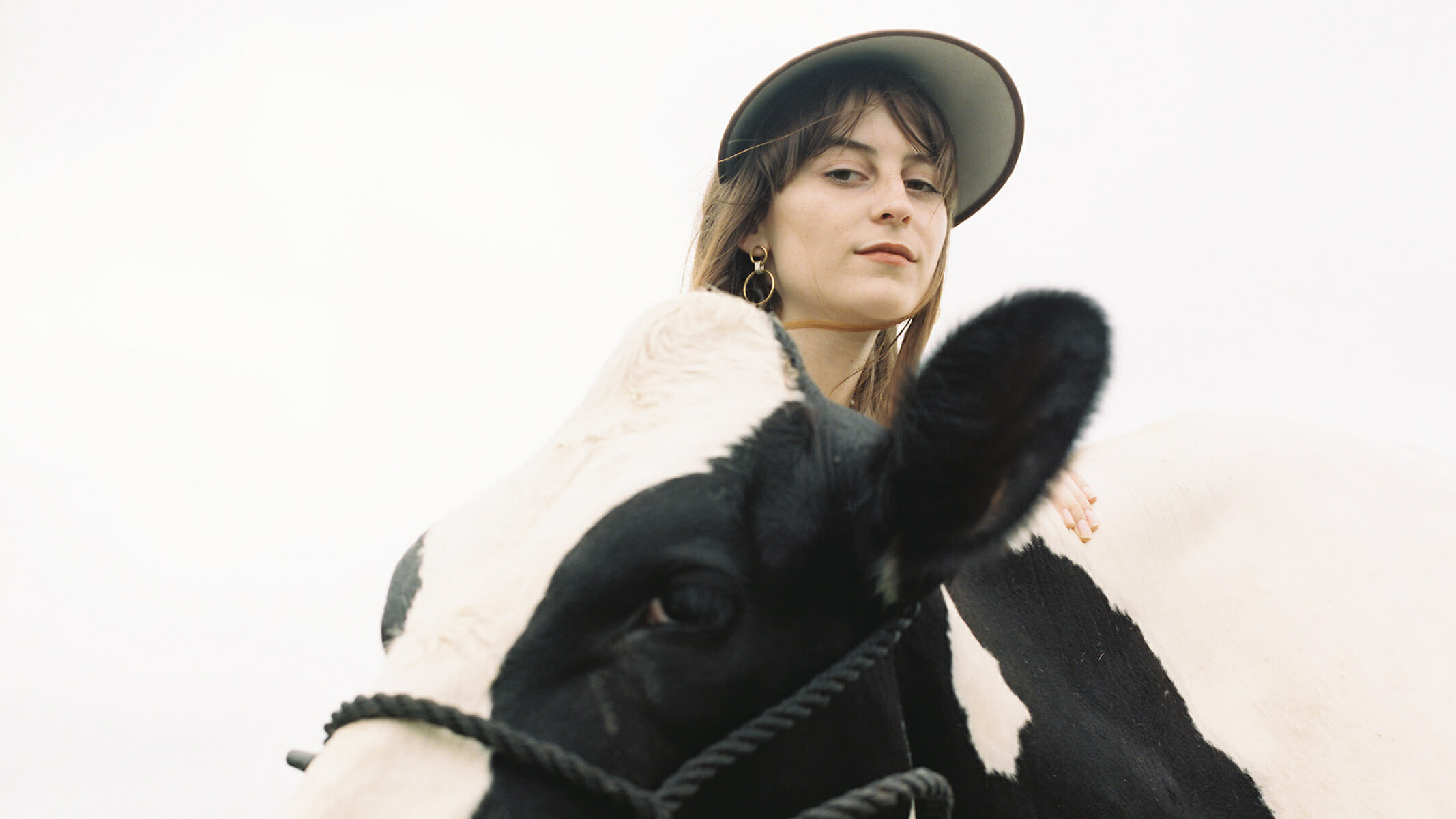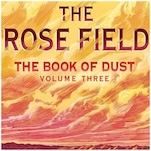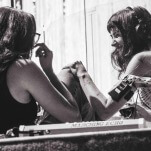Faye Webster Made the Album You’ll Be Swaying to All Summer Long
We meet up with Faye Webster on the ground in ATL to discuss the riches of her third LP Atlanta Millionaires Club, the ultimate summer relaxer.
Image via Eat Humans
I spot Faye Webster’s dog before I see her.
Wiley, a very large Siberian husky, sticks out among the usual run of French bulldogs and labradoodles, and he’s at her side when I approach the pair sitting outside Carroll Street Cafe, a diner just a few blocks from Webster’s home in Atlanta’s Cabbagetown neighborhood. It’s a very warm, sunny day in May, Braves season is finally in full swing, and Webster is dressed appropriately for both occasions in her signature visor and a vintage t-shirt bearing her favorite baseball team’s logo. The singer/songwriter is fresh off a tour with folk-rockers Lord Huron and taking some down time before the next venture: the arrival of her third solo LP and Secretly Canadian debut, Atlanta Millionaires Club, and another round of coinciding dates. This all follows another tour with like-minded Aussie songwriter Stella Donnelly, so the 21-year-old musician is eager for some hard-won time at home.
“When I’m not touring, I don’t leave my house much,” Webster says. “But that’s because there’s everything I need within like four streets.”
If she prefers to stay inside, then Webster makes music for her own kind: With all its droopy pedal steel, unhurried funk and a breezy island air that could sub in for your AC, Atlanta Millionaires Club is the perfect summer album for indoors-y types. Drawing on both her Americana roots and the bendy R&B of artists like Aaliyah (one of her cited inspirations), Webster creates a dramaticized retelling of romantic shortcomings that sounds like the sun crying.
Webster isn’t a stranger to switching things up. Go another three or so miles north of where we’re sitting down for coffee and you’re in Midtown, Webster’s childhood stomping grounds where her parents still live. Inspired by the country artists they played for her growing up—like Glen Campbell, Asleep at the Wheel and Garth Brooks (“before he turned it into Chris Gaines”)—Webster began writing her own tunes at age 14. Less than two years later she released her solo debut, 2013’s Run and Tell, an unruffled roots effort with equal parts country sap and Americana grit, plus a damn fine cover of Bruce Springsteen’s “Dancing in the Dark.” It wasn’t long before she immersed herself in the fringes of Atlanta’s hip-hop scene as a member of the rap collective PSA and, later, Awful Records, “a group of likeminded Atlanta ‘weirdos’ who like to party and make art.”
“Both of those always be squad,” she says. “It’s like family forever.”
After Run and Tell and high school, Webster did what any aspiring songwriter would: moved to Nashville. There, she studied songwriting at Belmont University before trying out graphic design, but when she found herself jonesing for a trip home every other weekend, decided to abandon collegiate life altogether. She loaded up on one last semester’s worth of electives (like photography, and other “fun classes—that’s what I believe you should go to college for anyways”) and made plans to return to Atlanta, where she has since stayed put. She stuck with photography, too, and has spent considerable time shooting various ATL stars like Offset and Lil Yachty. But it was an exposure to a certain professionalism that may have made the biggest impression on her.
“PSA was the first time I was exposed to people my age trying to do this,” Webster says. “So I don’t really think I would have even made it this far thinking I could do this if it wasn’t for PSA being like, ‘Nah, we’re really doing this. It’s not just a hobby.’ It’s really uplifting that kids can do this and it be a career.”
Thusly uplifted, Webster released her second, self-titled album after college. Faye Webster, which contains her first Spotify hit, the groovy “She Won’t Go Away,” is a hazy country dream. But dreamier still is Webster’s third solo LP, Atlanta Millionaires Club, a steamy brush with R&B flourished with lots of twang and retro grooves. It’s weird and sleepy and full of droll one-liners like “I should get out more,” the chorus from “Room Temperature.”
“I think what makes it nice is that there are songs on this record that could have been on my self-titled or could’ve even been on Run And Tell, my 16-year-old album,” Webster says. “Every album has been like the small gateway to something new, but it still all makes sense.”
While Atlanta Millionaires Club lopes off in a slightly new direction, it shares one defining characteristic with the rest of Webster’s songs: the pedal steel guitar. Though she doesn’t play the instrument herself (that task is charged to Matt “Pistol” Stossel), it’s the key to Webster’s distinct sound, and you can hear it in almost all of her songs. On “Room Temperature” it sounds like a luau; on “Kingston,” like a weepy countrypolitan waltz.
[It’s] my favorite instrument,” she says. “I try to have it in every song, so we revolve around pedal steel because that’s how much I love it and want it on my songs.”
Webster and her band let the instrument be their guide while recording the album at Athens’ Chase Park Studio. She again worked with producer Drew Vandenberg, who also mixed her 2017 self-titled album. “I don’t really switch things up that often,” she says.
But she does innovate on this record’s songwriting side. These are her most introspective and personal lyrics yet, with the album opening on the line “Looks like I’ve been crying again, over the same thing” from the aforementioned “Room Temperature.” On “Flowers,” which features an unexpected but delightful verse by Awful rapper Father, Webster asks over and over through staggered breaths, “I don’t have that much to offer / Can you just give me all your time? I’m gonna try to give you mine.” Later, she admits she didn’t even change any names, so the existential crisis that unfolds in “Jonny” and its reprise is 100% non-fiction. “I feel like I’m losing my mind, why the hell did I paint these walls white?” she sings before admitting she just wants a man who’ll “get over how my dog is my best friend / and he doesn’t even know what my name is.”
“It’s honestly so hard not to write about relationships,” she says, putting a nasaly emphasis on “relationships,” “just because that’s the only time that you feel like writing, you know? So when I wrote ‘Room Temperature,’ I was like, ‘Yes!’ because it was the first song that I’ve written where I don’t even mention anybody else but me and my surroundings. But it’s hard too because I can’t really sit down and pick a time to write. I can only write when I feel like it, which is normally when I’m sad and feel like writing, which is normally about relationships. So it’s refreshing to write a song that’s just for you and you’re not reminiscing about somebody else.”
It’s unsurprising, then, that Webster does all her writing alone. “Songwriting is such a sacred thing,” she says, before adding, “I’ll write songs like in a sitting and I just do not change it. I don’t try to make it rhyme if it doesn’t or I don’t try to change out words to make it sound prettier. I just think imperfections in songwriting are nice.”
As much as the pedal steel and self-reflective lyrics are synonymous with Faye Webster’s brand, so is Atlanta itself. The album’s title is borrowed from a piece of the city’s history—or, at least her dad’s version of it. A young Mr. Webster and his friends called themselves the Atlanta Millionaires Club in the ’80s, and what started as a running joke became a Kiwanis-like organization complete with sponsorships and 5K races. She named the album with his blessing, and inside is an inscription that reads “Dedicated to the founding members of Atlanta Millionaires Club, established 1989.”
“He’s always been really supportive,” she says of her dad. “[This is] the first time that I’ve kinda shown my family this is what I do, because my cousins are always like, ‘When’s Faye getting a real job? Does she have one yet?’ So I think it’s the first album where I’m like, ‘This is an occupation.’ But also, obviously, there’s a lot of meaning in Atlanta to me.”
We agree being a Braves fan is “just like one of those brainwash things from growing up” in town, but Webster is next-level. If you follow her on Instagram, you’d think she spends all her time either learning new yo-yo tricks or shopping for Braves gear. Someone from the team’s marketing department certainly thought so—they invited her to a recent game to sing “Take Me Out to the Ballgame” during the 7th inning stretch and back to the locker rooms where she met outfielder and current fan favorite Ronald Acuña Jr.
“He’s my favorite person alive,” she says. “He was my favorite before he was everybody’s favorite.”
From her Braves obsession to love for her community to her album title, it seems like all of Faye Webster’s roads lead to Atlanta. There’s even a song on the record featuring a convincing flute solo and a groovy horn section called “Come To Atlanta,” an invitation for a long-distance crush to touch down at Hartsfield-Jackson. “Why won’t you come here to visit?” she asks. “Why do you only speak of it?”
“Atlanta is creative, which is amazing, but everybody’s so different,” she says. “Everybody’s doing something that nobody else is doing.”
Later this year, Webster will play Atlanta’s annual Music Midtown Festival, and a June tour will take her to Europe, New York, Bonnaroo and beyond. But the tour’s last show is at a local club, and then she’ll be home for the remainder of the summer—just as it should be. Her “best friend” will surely be pleased.
“I get dog sick the most,” she says, gesturing to Wiley. “But I do get homesick.”







































